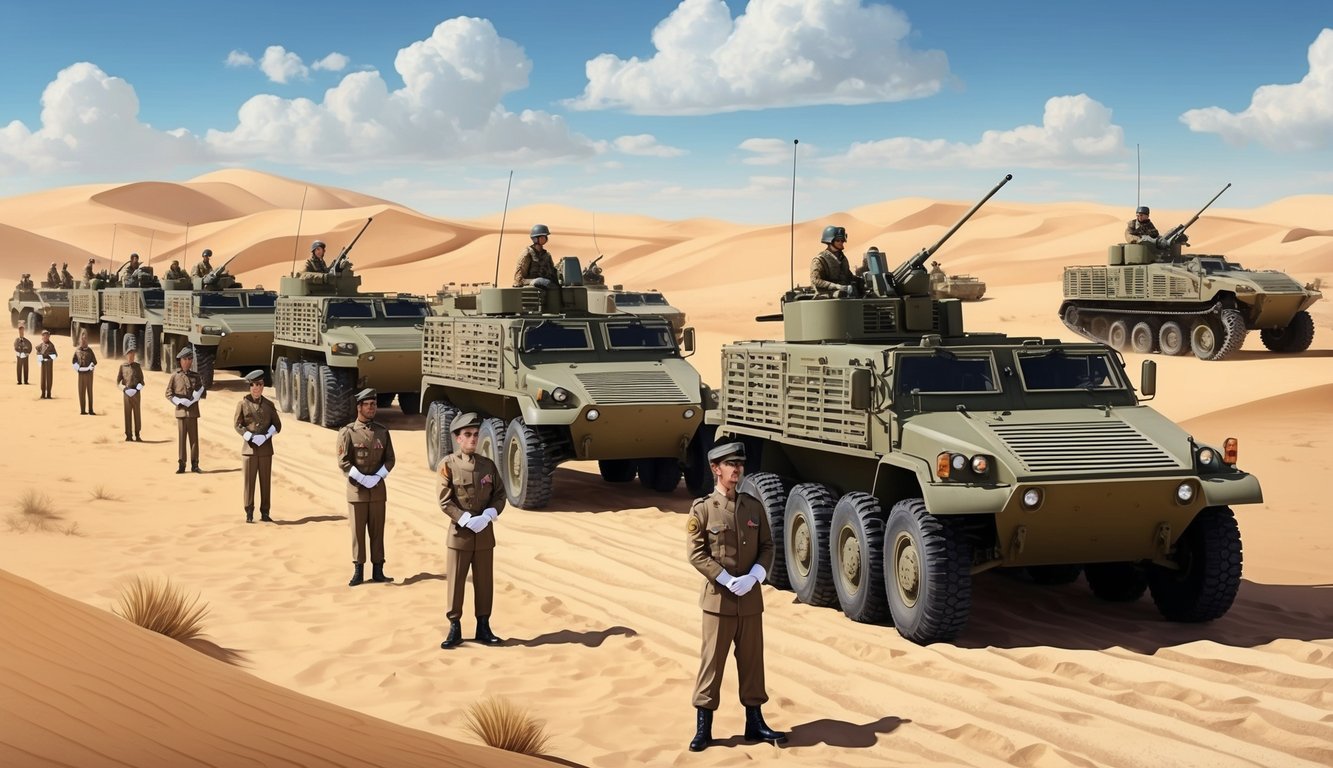The United Arab Emirates has developed a modern and advanced military force that has seen significant growth since the country became independent in 1971.
Starting from its early days as the Trucial Oman Scouts, the UAE Armed Forces have evolved into a strong regional power.
Today, the military of the UAE is recognized as one of the most effective and well-equipped forces in the Arab region, playing an essential role in regional security and international peacekeeping initiatives.

Interestingly, the military capabilities of the UAE extend beyond its borders.
The nation has engaged in numerous international missions, including peacekeeping and humanitarian assistance efforts.
This global participation has not only improved the UAE’s military effectiveness but also bolstered its diplomatic relationships with other countries.
As you explore the structure of the UAE’s armed forces, you’ll find a multifaceted organization featuring land, air, and naval branches.
The military’s organization reflects the country’s unique federal system, allowing each emirate to contribute to the national defense strategy while preserving local security autonomy.
Key Takeaways
- The UAE Armed Forces have swiftly modernized since 1971, establishing itself as a leading military power in the Arab world.
- The military engages in international operations, enhancing its capability and diplomatic relationships.
- The organization of the armed forces strikes a balance between federal cohesion and individual emirate defense autonomy.
Historical Overview
The military of the United Arab Emirates has seen substantial evolution since its inception, growing into a formidable contemporary force.
Its origins are rooted in British colonial systems, with recent activities encompassing both regional conflicts and global missions.
Formation and Early History
The roots of the UAE’s military can be traced back to the Trucial Oman Levies, which were formed in 1951.
This force, commanded by British officers, was responsible for maintaining order in the region prior to the establishment of the UAE.
In 1956, it was rebranded as the Trucial Oman Scouts.
Upon the founding of the UAE in 1971, the Union Defence Force was established as the military of the new nation.
Initially, each emirate operated its own defense forces.
In the 1970s and 1980s, efforts were made to unify and modernize the armed forces, focusing on acquiring advanced technology and improving training efforts.
Recent Engagements
Since the 1990s, the UAE military has actively participated in various international operations, contributing troops to the Gulf War coalition in 1991—marking its first significant international involvement.
The UAE has been involved in Afghanistan, supporting NATO efforts from 2003 to 2021 and taking part in counter-piracy missions off the coast of Somalia.
In recent years, UAE forces have been engaged in the Saudi-led intervention in Yemen since 2015 and have provided support in operations in Libya and Syria as part of broader regional security strategies.
Structure and Organization
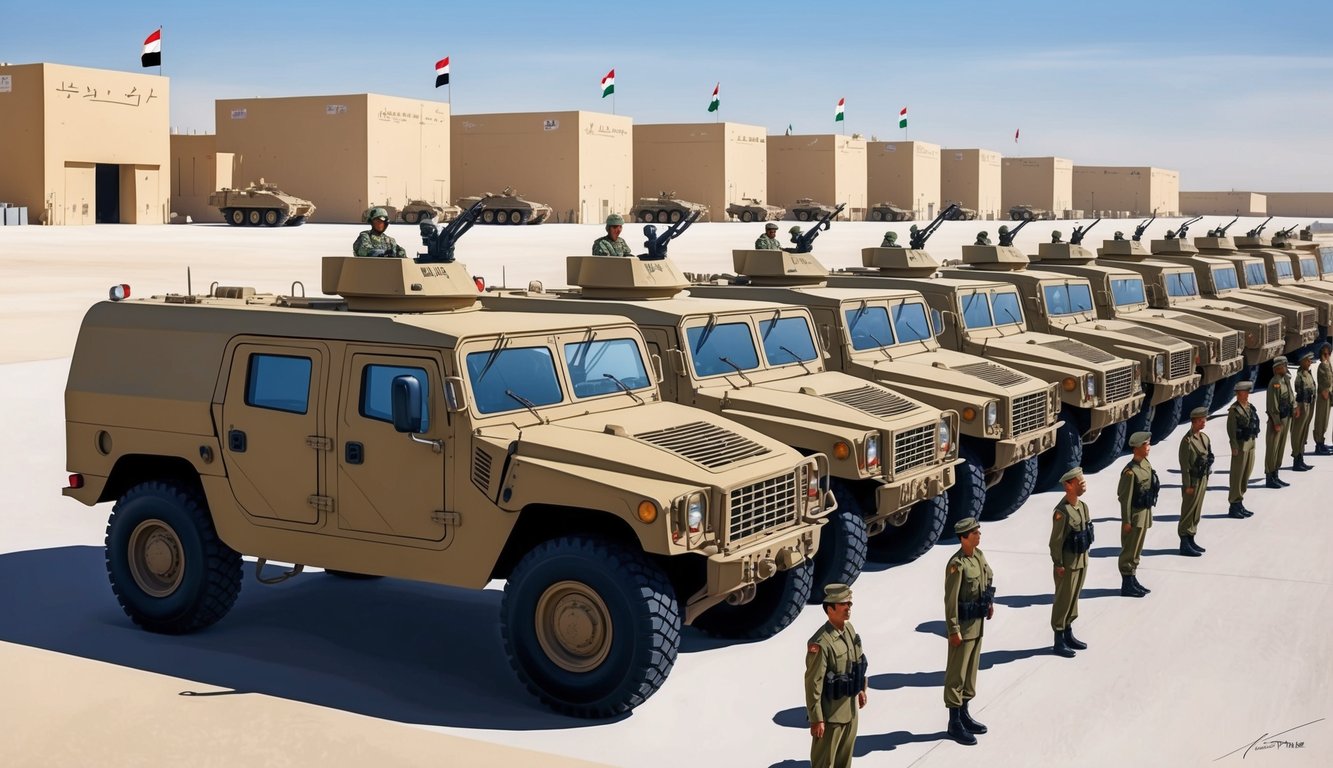
The military of the UAE features a well-structured organization with clearly defined command lines and specialized branches.
Its makeup reflects a blend of traditional and modern components, influenced by the country’s distinct history and strategic requirements.
Command Hierarchy
At the top of the UAE’s military structure, the President acts as the Supreme Commander of the Armed Forces.
The Minister of Defense is responsible for overseeing military operations, while the Chief of Staff manages everyday affairs.
The Joint Command and Staff College plays an essential role in preparing officers for leadership roles.
Notably, the Presidential Guard, an elite unit, reports directly to the President.
This force is charged with the protection of the nation’s leadership and handling sensitive operations.
Branches of the Military
The UAE Armed Forces consist of multiple branches, each focusing on specific functions.
The Army is the foundation of ground operations, while the Air Force operates a modern fleet for air defense and support missions.
The Naval Force is charged with safeguarding the UAE’s coastline and maritime interests, including the UAE Marines, a specialized amphibious unit.
The Special Forces play a critical role, trained for high-stakes missions and counter-terrorism operations, working closely with other branches to maintain national security.
Strategic Importance
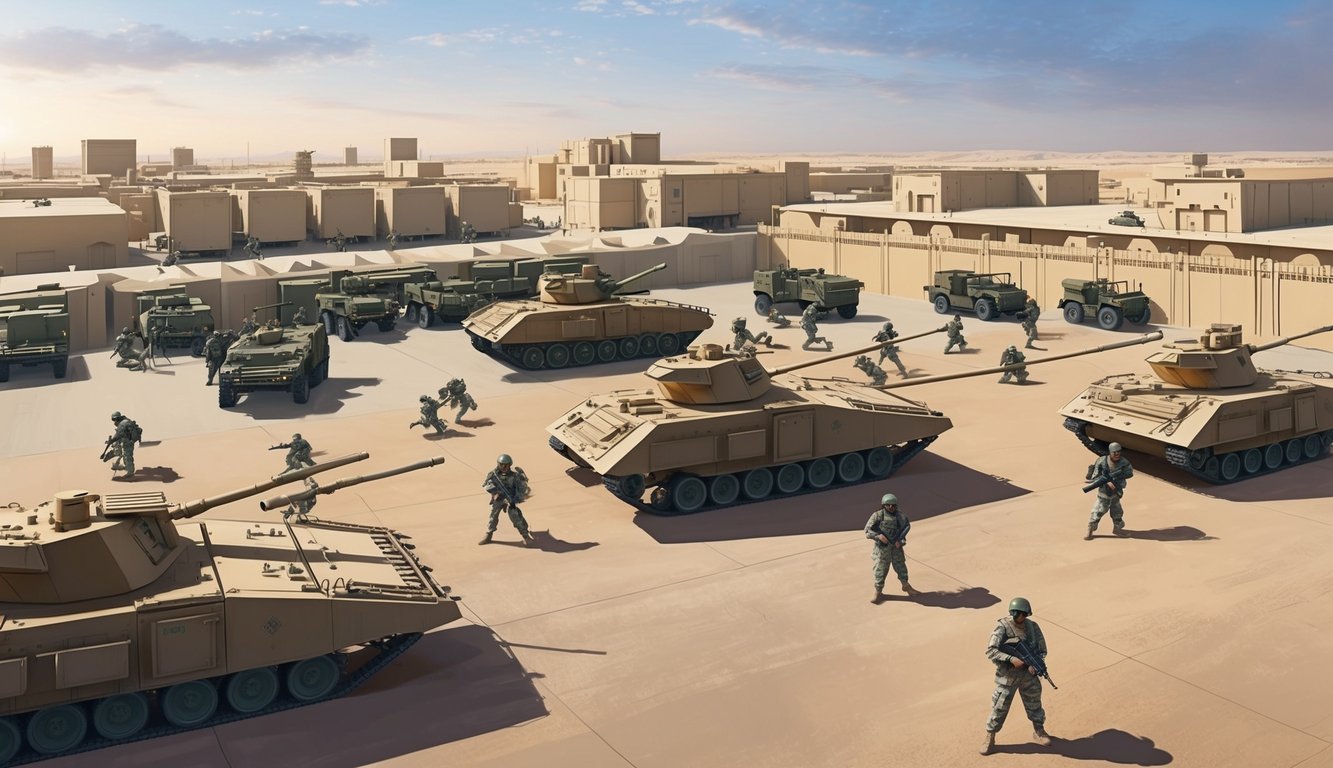
The United Arab Emirates has emerged as a significant military force in the Middle East, with its strategic importance extending beyond mere national defense, influencing regional relations and global partnerships.
Regional Influence
The military reach of the UAE extends across the Middle East and beyond.
They’ve played a vital part in the Saudi-led coalition in Yemen and have been active in humanitarian missions in Somalia and Libya, illustrating their influence beyond the Gulf region.
With its strategic location near the Strait of Hormuz, the UAE maintains control over a key oil shipping route, allowing it to impact regional maritime security and trade dynamics.
Often referred to as “Little Sparta” by U.S. military officials, the UAE has gained a reputation for its military effectiveness, markedly distinguishing itself from many others in the region.
Global Partnerships
Examining the UAE’s military strategy would be incomplete without acknowledging its international collaborations.
The UAE has established strong ties with Western nations, notably the United States, France, and the United Kingdom.
Recent pursuits for cutting-edge military equipment include F-35 fighter jets from the U.S. and Rafale jets from France, reflecting the nation’s ambition to enhance its armed forces with state-of-the-art technology.
NATO has acknowledged the UAE’s strategic significance, leading to cooperation in areas like counterterrorism and maritime security, further emphasizing the UAE’s growing role in global security affairs.
These alliances assist the UAE in balancing regional threats, particularly from Iran, while enhancing its status as a dependable ally in the volatile Middle East.
Defense Economy and Procurement
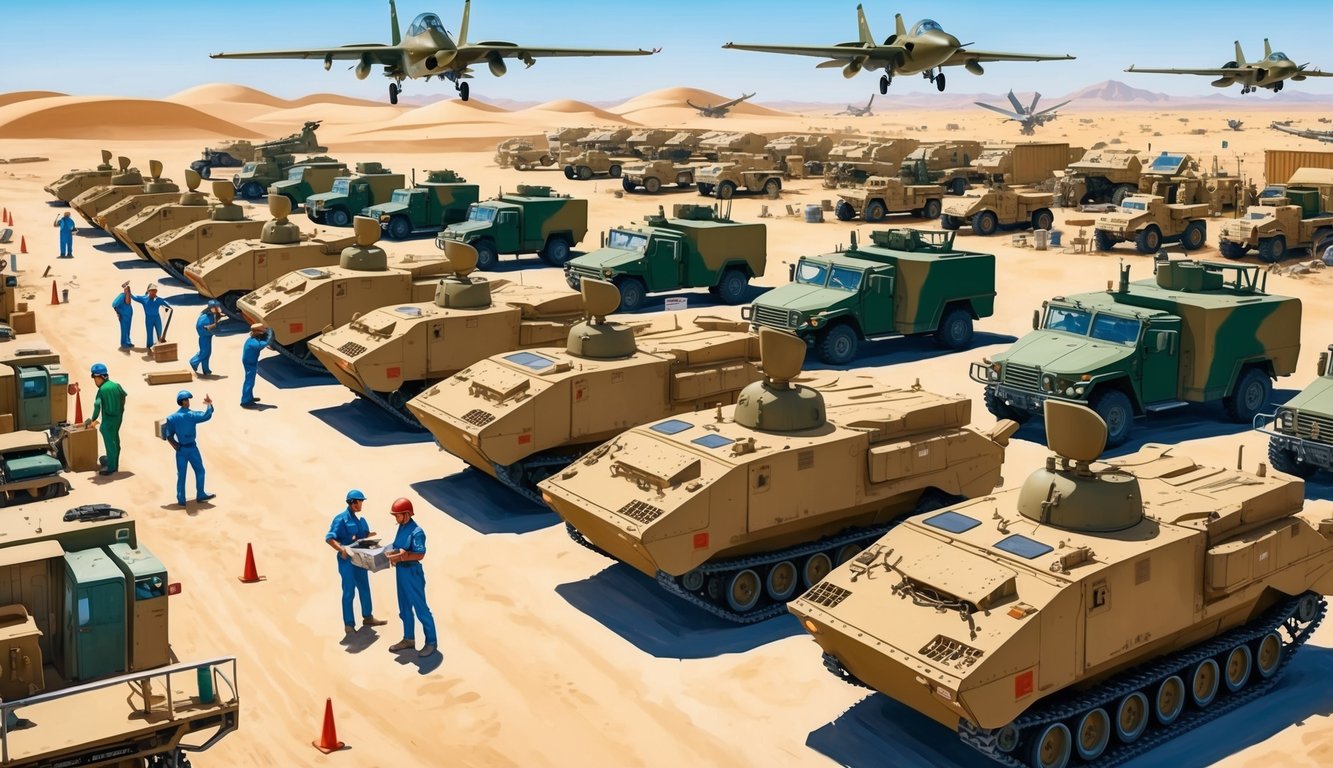
The UAE has established itself as a significant player in defense expenditure and arms procurement, making considerable investments focused on acquiring advanced weaponry and developing a domestic defense industry.
Military Spending
The UAE’s defense expenditure ranks impressively, placing it 6th globally in military spending as a percentage of GDP.
In 2020, the budget reached an impressive $19.8 billion, comprising 5.6% of the UAE’s GDP.
This investment allows the country to sustain a modern, well-equipped military.
Typically, the Air Force and Air Defense (AFAD) receive the largest budget allocations.
Between 2010 and 2019, approximately 15-16% of the annual defense budget went towards foreign suppliers, underscoring the UAE’s commitment to acquiring high-quality military technology globally.
International Arms Trade
In terms of arms procurement, the UAE is a notable player on the international scene, known for acquiring advanced weapon systems, including aircraft, armored vehicles, and sophisticated weaponry.
Some of its key acquisitions include Leclerc tanks and Mirage 2000 fighter jets, with the nation’s procurement strategy focusing on cutting-edge military systems to bolster its armed forces’ capabilities.
Additionally, the UAE is pursuing the development of its domestic defense industry, with companies like EDGE Group playing a significant part by securing contracts to supply the AFAD.
This shift towards local production aims to reduce reliance on foreign resources and stimulate the national economy.
Training and Education
The training and educational framework of the UAE’s military is comprehensive and world-class, designed to prepare personnel for contemporary warfare and future leadership roles through specialized training and ongoing professional development initiatives.
Military Academies
The UAE features several esteemed military academies, with the Zayed the Second Military Academy being a key institution for officer training.
Here, candidates undergo rigorous physical conditioning and receive instruction in advanced tactical skills.
The National Defense College caters to strategic education for senior military and civilian leaders, facilitating policy discussions and in-depth studies of national security challenges.
The UAE has partnerships with institutions like the United States Military Academy, providing opportunities for international exposure and perspectives on military leadership and operations.
Professional Development
Education in the military continues beyond initial training, as the UAE Armed Forces emphasize lifelong learning and continual skill improvement throughout service members’ careers.
Specialized training offerings are available in areas such as cybersecurity, drone technology, and counter-terrorism tactics, ensuring troops remain proficient in evolving military technologies.
The National Service Term, a mandatory program for Emirati men, imparts basic military training and fosters national values, forming a pivotal aspect of the UAE’s strategy to cultivate a dedicated citizenry.
Regular joint exercises with allied nations provide valuable opportunities for you to practice interoperability and exchange best practices with international partners.
Role in International Affairs
The UAE military has emerged as a prominent player in international affairs, with its forces actively participating in various global missions and forging robust alliances.
Peacekeeping Missions
You may find it interesting that UAE troops have contributed to several UN peacekeeping missions.
They have participated in the International Security Assistance Force in Afghanistan, aiding in the stabilization of the area.
UAE forces also made significant contributions to the United Nations Operation in Somalia II, providing humanitarian assistance, as well as participating in NATO’s Kosovo Force to maintain peace.
These missions reflect the UAE’s commitment to global security beyond its territorial boundaries.
Diplomatic Ties and Joint Exercises
The UAE military is proactive in developing relationships with other countries through joint exercises and training programs in addition to peacekeeping events.
You will often see UAE forces engaged in drills with U.S., U.K., and French military units, enhancing interoperability and solidifying diplomatic relationships.
Recently, the UAE conducted joint military exercises with Israel, marking a pivotal change in regional relations, which includes intelligence sharing and collaboration on military technology.
Involvement in the Yemen conflict has also influenced the UAE’s international role, albeit with some controversy surrounding it.
Domestic Influence
The military significantly shapes the UAE’s national identity and civil-military relations, influencing many facets of Emirati culture and society.
National Identity
Military service plays a vital role in forging a collective Emirati identity, evident in the pride displayed during Military Union Day celebrations and Commemoration Day events that honor fallen soldiers.
The Oasis of Dignity memorial in Abu Dhabi stands as a potent symbol of sacrifice for the nation.
The insignia and uniforms of the UAE Armed Forces serve as instantly recognizable symbols of national solidarity.
You’ll notice that military imagery is deeply ingrained in public consciousness and media, underscoring its significance to Emirati culture.
Introduced in 2014, mandatory military service for young Emirati men aims to cultivate discipline and patriotism, and is regarded as a rite of passage for many citizens.
Civil-Military Relations
The public in the UAE has a high degree of trust in its military, with strong connections between civilian leaders and the military’s high command.
The Presidential Guards undertake important ceremonial roles, reinforcing this relationship.
Military personnel often transition into government roles, influencing policy development, especially concerning national security and defense procurement.
Concerns have been expressed by human rights organizations regarding the use of foreign mercenaries within the UAE’s military, leading to discussions about transparency and accountability in military engagements.
The armed forces offer career paths and opportunities for social advancement for Emiratis, with military service seen as prestigious, particularly for individuals from less affluent backgrounds.
Military Technology and Capabilities
The UAE has made significant investments in state-of-the-art military technology and capabilities across the land, air, and sea, creating advanced systems and specialized units that bolster the nation’s defense and operational readiness.
Air and Missile Defense
The UAE boasts a sophisticated air and missile defense network that stands out.
The country maintains an integrated system that includes Patriot PAC-3 missiles and the THAAD (Terminal High Altitude Area Defense) system, offering a multi-layered defense against a variety of aerial threats.
The UAE Air Force operates advanced F-16 Block 60 “Desert Falcon” fighter jets, tailored to meet the Emirates’ specific needs.
These aircraft feature cutting-edge avionics and weaponry that provide an upper hand in air combat scenarios.
Maritime Security
To secure its coastline and maritime interests, the UAE Navy employs a diverse range of modern vessels, including Baynunah-class corvettes equipped with stealth capabilities and anti-ship missiles, ideal for Gulf patrols.
The fleet also comprises larger frigates and patrol boats, actively ensuring the security of vital shipping routes.
The navy is outfitted to conduct mine countermeasure operations and amphibious missions, developing a comprehensive maritime force.
Specialized Units
The UAE’s military strength extends beyond advanced technology.
An elite unit, the Presidential Guard, specializes in rapid response and special operations, undergoing rigorous training and utilizing the latest infantry weapons and equipment.
The Yarmouk Brigade, which focuses on desert warfare, employs specially adapted vehicles and tactics suited to the extreme environmental conditions.
The UAE’s Special Forces are also remarkable, trained for covert operations and counter-terrorism tasks with exceptional precision.
Military in the Public Sphere
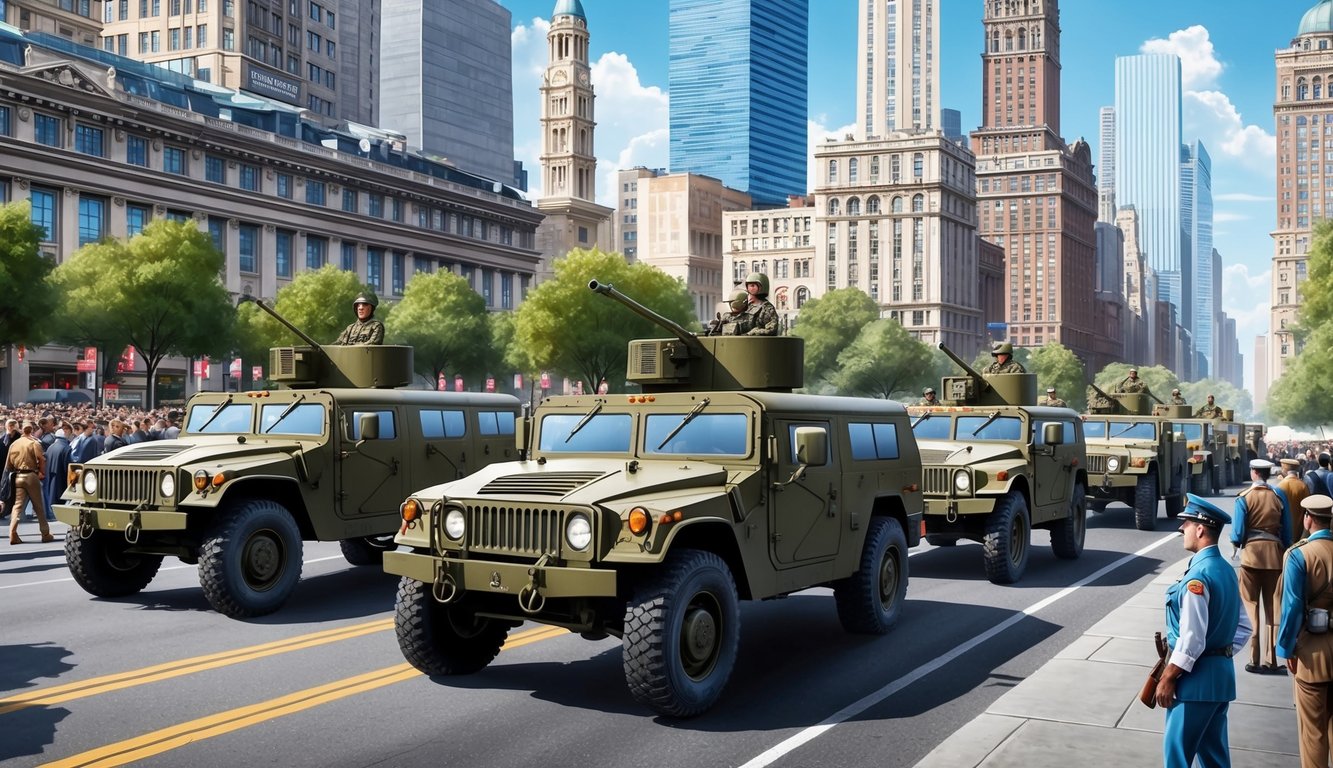
The UAE military plays a crucial role in shaping Emirati society and culture, impacting various sectors beyond military defense, including healthcare and education.
Cultural and Social Impact
The visibility of the military in Emirati culture is substantial.
Patriotic events prominently feature UAE soldiers and the Presidential Guards during parades and national festivities, where military personnel are regarded as role models.
The armed forces are a powerful promoter of national identity and unity, with military-themed events and exhibitions that highlight the UAE’s defense history and capabilities.
These occasions provide opportunities for citizens to engage with service personnel and learn about their experiences.
Popular among the youth, military education programs foster discipline and leadership skills.
Students might participate in cadet initiatives or organize visits to military academies for hands-on experiences.
Healthcare and Military Personnel
The UAE military has a significant impact on the healthcare sector.
Facilities initially designed for service members are now accessible to civilians, employing both military and civilian medical professionals.
The military medical corps contributes to public health efforts, often seen aiding in vaccination campaigns or disaster relief operations.
Their expertise plays a vital role in strengthening the healthcare infrastructure.
Collaboration occurs between U.S. military veterans and Emirati forces, facilitating knowledge transfer in emergency medical training and response protocols.
The late Sheikh Zayed bin Sultan Al Nahyan prioritized healthcare quality for military members, a legacy that persists today through specialized clinics and rehabilitation centers catering to service members and veterans.
Frequently Asked Questions

The military of the UAE has drawn significant public interest in recent times, with many seeking answers concerning its organization, capabilities, and enlistment opportunities.
What is the current global rank of the UAE military?
The UAE military is among the top 50 globally regarding overall strength, with its ranking varying based on annual defense expenditure and modernization initiatives.
How can one enlist in the UAE Army?
Eligibility to enlist in the UAE Army requires being a UAE citizen between the ages of 18 and 30.
Applicants must pass physical and medical evaluations, and the recruitment process generally involves submitting documents and undergoing interviews at a recruitment center.
What are the primary types of military equipment used by the UAE?
The UAE military utilizes a combination of advanced equipment from Western nations and Russia, such as F-16 and Mirage fighter jets, Apache helicopters, Leclerc tanks, and various missile defense systems.
What is the overall military strength of the United Arab Emirates?
The UAE possesses a relatively small yet highly capable military force, with approximately 65,000 active personnel across its army, air force, and navy, and an extensive investment in modern military technology and training.
Who is the present Chief of Staff of the United Arab Emirates Armed Forces?
As of 2024, Lieutenant General Hamad Mohammed Thani Al Rumaithi serves as the Chief of Staff of the UAE Armed Forces, a role he has held since 2005.
What is the average salary for personnel in the UAE Army?
Salaries within the UAE Army can vary based on rank and experience, with entry-level soldiers typically earning between 10,000 and 15,000 AED monthly, while officers and specialists tend to receive higher compensation.

